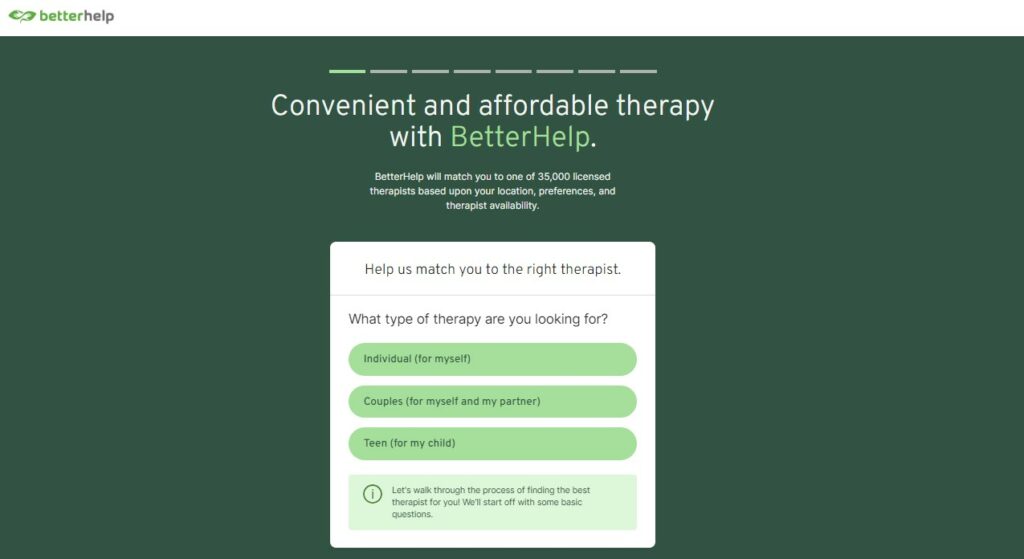Your relationship with money can have a massive impact on your overall well-being.
If you are struggling with spending, saving, debt, budgeting, or other financial issues, financial therapy can help you break free of the behaviors and habits preventing you from reaching your financial goals.
In this guide, we’ll discuss the five best online financial therapy services/therapist databases you can use to find help.
Want to skip right to the suggestions for financial therapists? Here are our 5 recommended therapy solutions:
Best financial therapy services
In this part, we’ve looked at the five best ways to find a financial therapist near you, using online services.
| Povider | Good For | Location | Pricing |
|---|---|---|---|
| BetterHelp | Quick match with the right therapist for you | Online therapy | $65 to $90 per week (billed every 4 weeks) |
| TalkSpace | Depression, anxiety, bipolar disorder, OCD, PTSD, LGBTQIA+ therapy | Online therapy | Varies according to insurance coverage or self-pay options |
| Financial Therapy Association | Find and contact the right financial counselor for you | Online and in-person therapy | Varies depending on the counselor fee |
| Financial Therapy Solutions | Financial therapy | Online therapy | Varies depending on the service you choose |
| Sound Financial Therapy | Individual financial therapy, couples financial therapy, financial marriage prep, financial coaching | Online therapy | Varies depending on the service you choose |
1. BetterHelp

Explore emotional well-being with BetterHelp – your partner in affordable online therapy. With 30,000+ licensed therapists and plans starting from only $65 per week, BetterHelp makes self-care accessible to all. Complete the questionnaire to match with the right therapist.
- Good for: Quick match with the right therapist four you.
- Location: Online therapy.
- Pricing: $65 to $90 per week (billed every 4 weeks).
- Features: iOS and Android app available, message your therapist anytime, live sessions are scheduled weekly and done via live chat, phone, or video call.
BetterHelp has a team of therapists including psychologists, social workers, family therapists, and licensed professional counselors, specializing in a broad range of areas such as anxiety, business and financial therapy, and other psychological and emotional issues.
Read our BetterHelp review here.
2. TalkSpace

Tailored to individuals, couples, teens, and offering psychiatry services, Talkspace plans kick off at a wallet-friendly $69 per week. What’s more, many health insurances also cover their services, enhancing accessibility and affordability. Complete a questionnaire and get matched with the right therapist for you.
- Good for: Depression, anxiety, bipolar disorder, OCD, PTSD, LGBTQIA+ therapy.
- Location: Online therapy.
- Pricing: Varies according to insurance coverage or self-pay options.
- Features: Accepts insurance, pick your therapist from a list of recommendations, live video sessions and unlimited messaging with your therapist, medication management.
TalkSpace is a popular virtual therapy app that provides individual, partner, and family therapy. On this platform, you will be matched with the right financial counselor for you after answering a short questionnaire to assess your needs.
Read our TalkSpace review here.
3. Financial Therapy Association

- Good for: Finding and contacting the right financial counselor for you.
- Location: Online and in-person therapy.
- Pricing: Varies depending on the counselor fee.
- Features: Filter your search, contact your therapist directly, offers educational resources.
The Financial Therapy Association is a community of specialists dedicated to promoting financial therapy assistance. Their directory offers a wide range of customizable search options that enable you to find a financial counselor near you who will work to deeply understand your background, experiences, and goals.
4. Financial Therapy Solutions

- Good for: Financial therapy.
- Location: Online therapy.
- Pricing: Varies depending on the service you choose.
- Features: Offers courses to improve your relationship with money, offers a free discovery call to evaluate if you need financial therapy.
Financial Therapy Solutions offers diverse resources, including financial therapy to improve your relationship with money. On this website, you can schedule a free call to learn more about financial therapy and decide whether this is what you need or not.
5. Sound Financial Therapy

- Good for: Individual financial therapy, couples financial therapy, financial marriage prep, financial coaching.
- Location: Online therapy.
- Pricing: Varies depending on the service you choose.
- Features: Free 20-minute consultation call, choose a financial therapy plan according to your needs, find resources to improve your relationship with money.
On Sound Financial Therapy you can find different types of financial therapy according to your needs. On this website, you can schedule a session with a qualified financial therapist ready to help you improve your relationship with money.
What is Financial Therapy?

Financial therapy helps people reframe their relationship with money.
It’s helpful to think of it as a cross between mental health and personal finance.
- A mental health provider focuses on your thoughts, feelings, beliefs, and behaviors in order to promote positive change and personal evolution.
- A financial planner focuses on your budgets, financial planning, investments, retirement funds, and financial goals.
- Financial therapy is the melding of these two worlds and explores how you think, feel, and behave with money.
Who Should See a Financial Therapy Provider?
Money can cause significant amounts of stress, regardless of your socioeconomic status.
As stressful as money problems can seem, it’s important to have a healthy relationship with your finances. Money is something you have to deal with daily. You pay bills, receive credit card statements, buy groceries, and earn income. One of the closest relationships you have is with your money, yet it can also be one of the most toxic.
Consider this: would you want to be in a relationship with someone if they made you feel like your money does?
If the answer is no, financial therapy can help you heal your relationship with money, just like couples counseling helps many couples heal their marriage.
Essentially, financial therapy is for anyone who needs to take a deeper dive into their money issues, and get back on track on their money journey.
A financial therapy professional can help you understand issues like your money management style, why you’re in so much credit card debt, and how your family members and life experiences influence your relationship with money. They can also help clients understand feelings of shame, perfectionism, or money avoidance, and help you with financial planning and financial disagreements with family members.
If you are someone who experiences negative emotions when dealing with money and financial planning, taking the opportunity to talk to a certified financial therapist may help ease your anxiety.
What Does a Financial Therapist Do?

Much like doctors who specialize in pediatrics, oncology, or cardiology, mental health therapists often choose to specialize in a particular area. Some will focus on family, relationships, or trauma, while others gain expertise in addiction or bereavement.
A financial counseling professional specializes in the emotional issues around money.
What Qualifies Someone to Provide Financial Therapy?
Financial therapy is a relatively new field and has only been around for about a decade. Because the field is so new, there is no established training, degree, or certification just yet. Unlike medicine or psychology, financial therapists don’t major in financial therapy in college.
Financial therapists are usually trained as social workers, financial planners, or mental health counselors. Because this profession combines both mental health and financial planning, most therapists have certifications in both areas. For example, someone who is a licensed social worker may also undergo training to become a Certified Financial Planner (CFP).
On the other hand, someone whose background is in accounting may opt to go back to school and become a Licensed Marriage and Family Therapist (LMFT), in order to specialize in financial therapy pertaining to families. These professionals are known as family therapists.
Money Scripts

No two financial therapy clients are alike. Each individual is unique, and so are the issues they want to discuss and overcome. But the goal of every therapist is to delve into their client’s core beliefs about money and how they came to be. In the financial therapy world, these beliefs are called “money scripts”.
Money scripts are important because they help you begin to understand the history that contributed to your financial knowledge and ideas about money, also known as your money story. We all have unique money scripts that are formed by our personal experiences and family circumstances.
When you begin seeing a financial therapy provider, they will help you uncover your money scripts so you can begin gaining some insight into your learned behavior around money.
Before your first financial therapy session, it’s a good idea to take some time to consider where you fall within the four main categories of money scripts.
1. Money Avoidance
Those who fall under this category believe that money is somehow bad and rich people are greedy or corrupt. They avoid looking at bank statements and credit card bills and may have a tendency to compulsively shop.
A typical script or belief someone with money avoidance may have is, “money is the root of all evil”, or “spiritual people should not care about finances”.
2. Money Status

Those who fall under the money status category believe that their worth lies in how much money they have. They fixate on outward appearance and may prioritize buying new clothes or a fancy car over a more sensible investment. They may say and believe things like “money makes the world go round”, or “your success is defined by your wealth”.
3. Money Worship
Money worshipers believe that money is the key to happiness. They will buy things in an attempt to feel good, yet never quite feel like they have enough. A typical belief may sound like, “more funds equals more freedom”, “money is power”, or “if I could just make more money, then I’d be happier”.
4. Money Vigilance

The money vigilant are incredibly concerned with their financial health. They need to save money to feel secure, and believe that money is the result of a hard day’s work. While those in this category are usually smart with their spending, they tend to have rigid beliefs and high levels of anxiety about money management and financial planning. An example of a script might be “dollar bills don’t grow on trees”, or “people don’t deserve financial handouts”.
Each of these scripts is a learned belief, and often reflects the ideas your family members had about money as you were growing up. Financial therapy will take you through these old stories, ingrained patterns, and limiting beliefs so you can begin to see how your current money mindset came to be.
Conclusion
The importance of financial therapy lies in its ability to address the intricate relationship between individuals’ financial behaviors, beliefs, and emotions.
Through each session with your financial therapist, you will gain more insights into your spending habits, business and family relationships, as well as reasons why you might feel like you never have enough money, or have problems with financial planning.
With this deeper understanding of your relationship with money, you will be well on your way towards improving your financial well-being.
References
Klontz, B., Britt, S. L., Mentzer, J., & Klontz, T. (2011). Money beliefs and financial behaviors: Development of the Klontz Money Script Inventory. Journal of Financial Therapy, 2(1), 1. Link.





